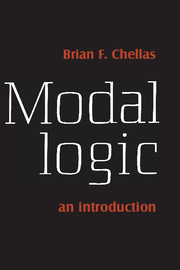Summary
This book is an introductory text in modal logic, the logic of necessity and possibility. It is intended for readers with the equivalent of a first course in formal logic, and it is designed to be used as a basic text in courses at the advanced undergraduate or beginning graduate level. The material in the book can easily be covered in a full-year course; with selectivity most of the material can be covered in a single term.
There are three parts to the book. Part I consists of two chapters, meant to introduce the reader to the subject of modal logic and to furnish a sufficient background for the parts that follow. Chapter 1 is a relatively informal examination of S5, one of the best-known systems of modal logic. Chapter 2 – ‘Logical preliminaries’ – contains almost everything needed for an understanding of the rest of the book. Some readers may prefer to go quickly through this chapter and then reread as necessary sections required in the context of succeeding chapters.
Part II comprises four chapters on standard models and normal systems of modal logic. The models, sometimes called ‘Kripke models’, are explained in chapter 3. In chapter 4 normal systems are presented from an axiomatic standpoint. Chapter 5 contains theorems on completeness and decidability, which bring together the model-theoretic and deductive-theoretic treatments of the preceding chapters. As an illustration of normal systems chapter 6 offers a discussion of deontic logic, the logic of obligation.
- Type
- Chapter
- Information
- Modal LogicAn Introduction, pp. xi - xiiPublisher: Cambridge University PressPrint publication year: 1980



